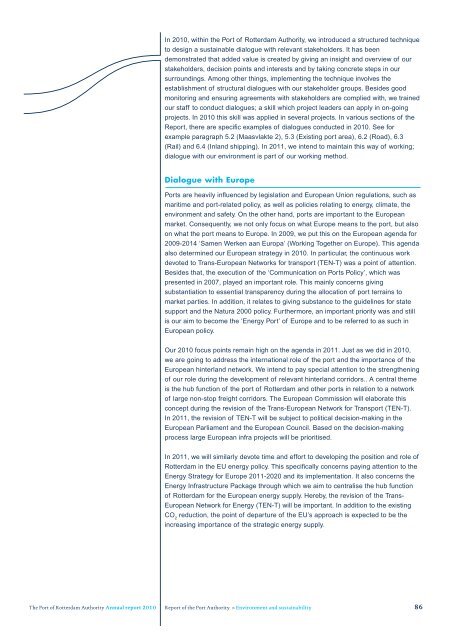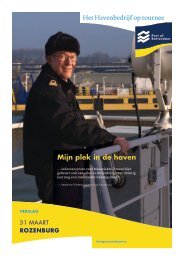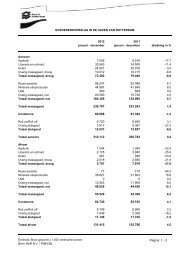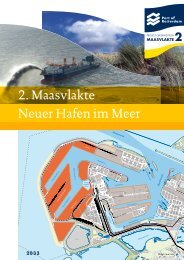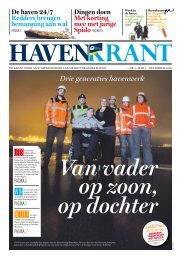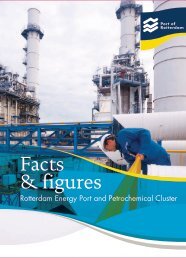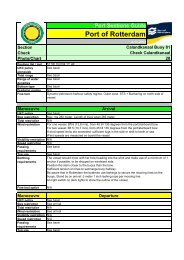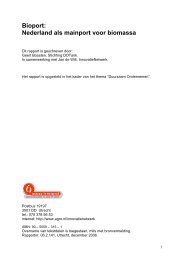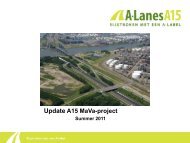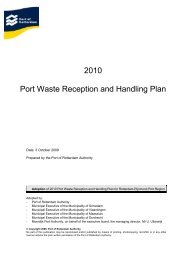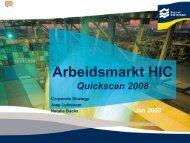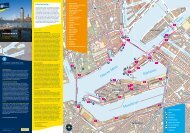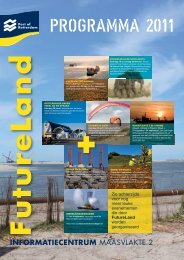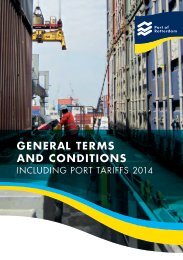Download annual report 2010 - Port of Rotterdam
Download annual report 2010 - Port of Rotterdam
Download annual report 2010 - Port of Rotterdam
Create successful ePaper yourself
Turn your PDF publications into a flip-book with our unique Google optimized e-Paper software.
The <strong>Port</strong> <strong>of</strong> <strong>Rotterdam</strong> Authority Annual <strong>report</strong> <strong>2010</strong><br />
In <strong>2010</strong>, within the <strong>Port</strong> <strong>of</strong> <strong>Rotterdam</strong> Authority, we introduced a structured technique<br />
to design a sustainable dialogue with relevant stakeholders. It has been<br />
demonstrated that added value is created by giving an insight and overview <strong>of</strong> our<br />
stakeholders, decision points and interests and by taking concrete steps in our<br />
surroundings. Among other things, implementing the technique involves the<br />
establishment <strong>of</strong> structural dialogues with our stakeholder groups. Besides good<br />
monitoring and ensuring agreements with stakeholders are complied with, we trained<br />
our staff to conduct dialogues; a skill which project leaders can apply in on-going<br />
projects. In <strong>2010</strong> this skill was applied in several projects. In various sections <strong>of</strong> the<br />
Report, there are specific examples <strong>of</strong> dialogues conducted in <strong>2010</strong>. See for<br />
example paragraph 5.2 (Maasvlakte 2), 5.3 (Existing port area), 6.2 (Road), 6.3<br />
(Rail) and 6.4 (Inland shipping). In 2011, we intend to maintain this way <strong>of</strong> working;<br />
dialogue with our environment is part <strong>of</strong> our working method.<br />
Dialogue with Europe<br />
<strong>Port</strong>s are heavily influenced by legislation and European Union regulations, such as<br />
maritime and port-related policy, as well as policies relating to energy, climate, the<br />
environment and safety. On the other hand, ports are important to the European<br />
market. Consequently, we not only focus on what Europe means to the port, but also<br />
on what the port means to Europe. In 2009, we put this on the European agenda for<br />
2009-2014 ‘Samen Werken aan Europa’ (Working Together on Europe). This agenda<br />
also determined our European strategy in <strong>2010</strong>. In particular, the continuous work<br />
devoted to Trans-European Networks for transport (TEN-T) was a point <strong>of</strong> attention.<br />
Besides that, the execution <strong>of</strong> the ‘Communication on <strong>Port</strong>s Policy’, which was<br />
presented in 2007, played an important role. This mainly concerns giving<br />
substantiation to essential transparency during the allocation <strong>of</strong> port terrains to<br />
market parties. In addition, it relates to giving substance to the guidelines for state<br />
support and the Natura 2000 policy. Furthermore, an important priority was and still<br />
is our aim to become the ‘Energy <strong>Port</strong>’ <strong>of</strong> Europe and to be referred to as such in<br />
European policy.<br />
Our <strong>2010</strong> focus points remain high on the agenda in 2011. Just as we did in <strong>2010</strong>,<br />
we are going to address the international role <strong>of</strong> the port and the importance <strong>of</strong> the<br />
European hinterland network. We intend to pay special attention to the strengthening<br />
<strong>of</strong> our role during the development <strong>of</strong> relevant hinterland corridors.. A central theme<br />
is the hub function <strong>of</strong> the port <strong>of</strong> <strong>Rotterdam</strong> and other ports in relation to a network<br />
<strong>of</strong> large non-stop freight corridors. The European Commission will elaborate this<br />
concept during the revision <strong>of</strong> the Trans-European Network for Transport (TEN-T).<br />
In 2011, the revision <strong>of</strong> TEN-T will be subject to political decision-making in the<br />
European Parliament and the European Council. Based on the decision-making<br />
process large European infra projects will be prioritised.<br />
In 2011, we will similarly devote time and effort to developing the position and role <strong>of</strong><br />
<strong>Rotterdam</strong> in the EU energy policy. This specifically concerns paying attention to the<br />
Energy Strategy for Europe 2011-2020 and its implementation. It also concerns the<br />
Energy Infrastructure Package through which we aim to centralise the hub function<br />
<strong>of</strong> <strong>Rotterdam</strong> for the European energy supply. Hereby, the revision <strong>of</strong> the Trans-<br />
European Network for Energy (TEN-T) will be important. In addition to the existing<br />
CO reduction, the point <strong>of</strong> departure <strong>of</strong> the EU’s approach is expected to be the<br />
2<br />
increasing importance <strong>of</strong> the strategic energy supply.<br />
Report <strong>of</strong> the <strong>Port</strong> Authority > Environment and sustainability<br />
86


